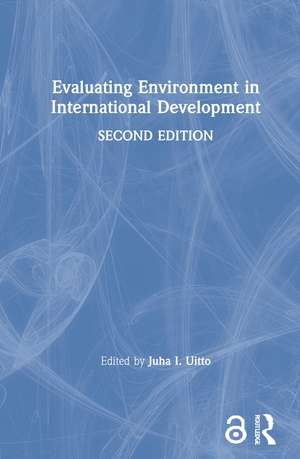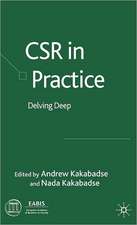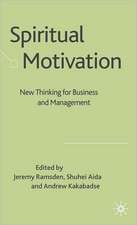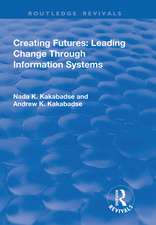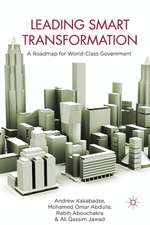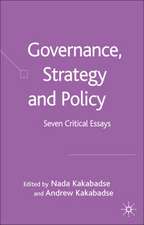Evaluating Environment in International Development
Autor Juha I. Uittoen Limba Engleză Hardback – 31 mar 2021
This book provides novel and in-depth perspectives on evaluating environment and sustainability issues in developing countries.
Evaluating Environment in International Development focuses on the approaches and experiences of leading international organizations, not-for-profits, and multilateral and bilateral aid agencies to illustrate how systematic evaluation is an essential tool for providing evidence for decision-makers. Moving beyond projects and programmes, it explores normative work on the environment as well as environmental consequences of economic and social development efforts. This new edition reflects on the 2030 Agenda for Sustainable Development and Sustainable Development Goals and considers how they have influenced efforts in a wide range of countries and what the implications are for evaluation. It also explores ways in which Big Data and geospatial approaches might be utilized.
Significantly updated throughout to reflect recent developments in climate change research, and on the implications of the 2020 pandemic, this volume will be of great interest to students and scholars of environment studies, development studies, international relations, sustainable development and evaluation, as well as practitioners in international organizations and development and environmental NGOs.
| Toate formatele și edițiile | Preț | Express |
|---|---|---|
| Paperback (1) | 357.81 lei 6-8 săpt. | |
| Taylor & Francis – 31 mar 2021 | 357.81 lei 6-8 săpt. | |
| Hardback (1) | 767.07 lei 6-8 săpt. | |
| Taylor & Francis – 31 mar 2021 | 767.07 lei 6-8 săpt. |
Preț: 767.07 lei
Preț vechi: 1104.46 lei
-31% Nou
146.80€ • 152.69$ • 121.19£
Carte tipărită la comandă
Livrare economică 14-28 aprilie
Specificații
ISBN-10: 0367557096
Pagini: 346
Ilustrații: 33 Line drawings, black and white; 20 Tables, black and white; 33 Illustrations, black and white
Dimensiuni: 156 x 234 mm
Greutate: 0.61 kg
Ediția:2 New edition
Editura: Taylor & Francis
Colecția Routledge
Locul publicării:Oxford, United Kingdom
Public țintă
Postgraduate and Undergraduate AdvancedCuprins
Notă biografică
Recenzii
"This book could not be more timely. Evaluating Environment in International Development in its first edition was already a seminal book and a reference to the community of evaluators and researchers working on international development. The second edition addresses spot on the challenges of identifying the intended and unintended consequences of development interventions on the environment, particularly those driven by the search of growth. It calls for a truly systemic view of the interaction between natural and human systems. It provides innovative interpretative frameworks and examples of evaluations that contribute to environmentally sound sustainable development. A must read as countries redouble efforts to recover from the COVID-19 crisis with the aim of building forward better." -- Oscar A. Garcia, Director, Independent Evaluation Office, United Nations Development Programme (UNDP)
"For thinkers and practitioners alike, this volume is an excellent compendium of papers that bring together state of the art thinking in evaluation related to environment, while combining it with real-world experiences and lessons on the ground. The scholarship and wisdom of this volume is illustrated by the range of topics it covers in environmental evaluation that cover for instance, the challenges of examining trans-boundary problems on the one hand and precisely defined disaster risk reduction on the other. I recommend this collection highly." -- Jyotsna Puri, Director of the Environment, Climate, Gender and Social Inclusion Division, at the International Fund for Agricultural Development (IFAD)
Descriere
This book provides novel and in-depth perspectives on evaluating environment and sustainability issues in developing countries.
Evaluating Environment in International Development focuses on the approaches and experiences of leading international organizations, not-for-profits, and multilateral and bilateral aid agencies to illustrate how systematic evaluation is an essential tool for providing evidence for decision-makers. Moving beyond projects and programmes, it explores normative work on the environment as well as environmental consequences of economic and social development efforts. This new edition reflects on the 2030 Agenda for Sustainable Development and Sustainable Development Goals and considers how they have influenced efforts in a wide range of countries and what the implications are for evaluation. It also explores ways in which Big Data and geospatial approaches might be utilized.
Significantly updated throughout to reflect recent developments in climate change research, and on the implications of the 2020 pandemic, this volume will be of great interest to students and scholars of environment studies, development studies, international relations, sustainable development and evaluation, as well as practitioners in international organizations and development and environmental NGOs.
